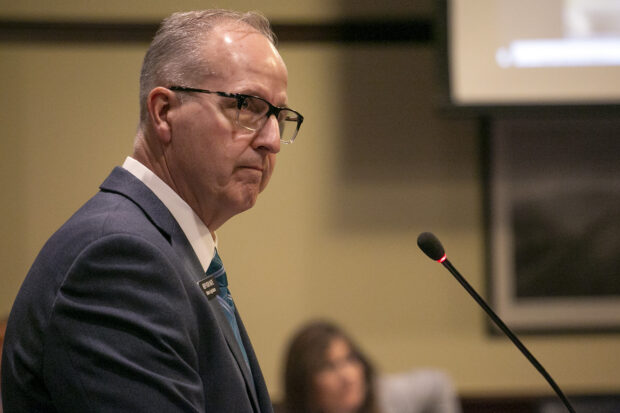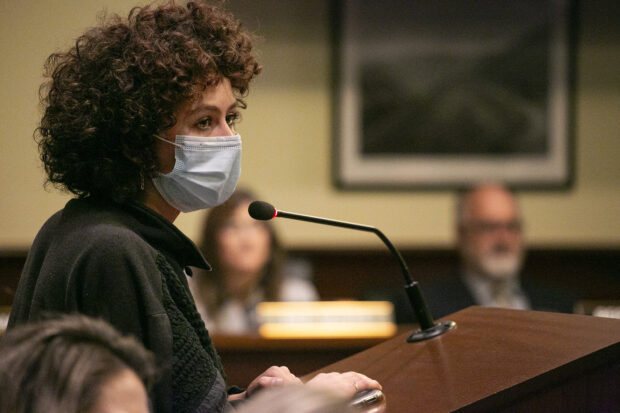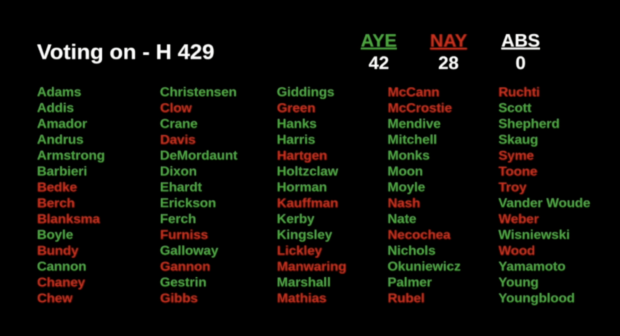A divided House of Representatives passed a bill allowing parents to opt their kids out of pandemic protocols — such as mask mandates and plexiglass partitions.
The bill made its way through the House within only a few hours. The House State Affairs Committee signed off on the idea Tuesday morning, setting up Tuesday afternoon’s 42-28 floor vote.
House Bill 429 now goes to the Senate.
In a resumed session focused largely on Monday’s House censure of Rep. Priscilla Giddings, and a potpourri of bills addressing federal coronavirus vaccine mandates, HB 429 is one of the most overtly education-related measures to emerge this week.

11:25 a.m.: After personal testimony, HB 429 passes committee
Sponsoring Rep. Ron Nate, R-Rexburg, pointed out that parents can already opt their kids out of state vaccination guidelines, and should have the same latitude when it comes to mask mandates and similar in-school measures.
“These kids are suffering in school,” said Nate, citing emails he has received about pandemic protocols, including one from a student who has struggled to wear a mask while playing basketball.
Testimony was often personal, and largely in favor of HB 429.
Tiffani Bates, a mother of four who is active in her local parent-teacher organization, said her first-grade son will not take his mask off in school, even outdoors. “He is scared he will get in trouble.”
Sarah Clendenon — a representative of Health Freedom Idaho — discussed her 15-year-old daughter’s experience in the West Ada School District. Clendenon was able to get an exemption for her daughter to go to high school without a mask, but her daughter then felt out of place around classmates who were masked. (On Monday, West Ada said it will lift its mask mandate after Thanksgiving.)
The school-imposed mask mandates, said Clendenon, amount to “practicing medicine without a license.”
Crystal Erickson said she is looking to pull at least two of her three children from Boise schools, due to the district’s mask mandate. She said children should not be expected to wear masks during gym class, or when playing saxophone in band.
“Nobody asks the kids that they want this,” Erickson said.

But Petra Hoffman, a 16-year-old Boise High School student, urged the committee to reject HB 429. She said her classmates are willing to wear masks, in order to slow the spread of coronavirus and keep schools open.
“Wearing a mask does not hurt us or our social interactions,” Hoffman said.
HB 429 is essentially an add-on to House Bill 67, passed earlier this year. That new law says only school districts — or the governor and the State Board of Education — have the authority to close schools or impose health protocols.
House State Affairs passed the bill on a party-line vote, with Boise Democrats John Gannon and Chris Mathias in opposition.
4:20 p.m.: House passes HB 429
The debate stretched out for more than an hour — and often became a referendum of sorts on masks in schools.
- “I just don’t think our children should grow up this way,” said Rep. Karey Hanks, R-St. Anthony, a school bus driver who says she doesn’t wear a mask on the job.
- “We don’t have an issue in our schools. Let’s let them learn,” said Rep. Dorothy Moon, R-Stanley, a former special education teacher. In debate, Moon erroneously said no Idaho children have died from COVID-19; the state reported its first child death last week, involving a Southwest Idaho infant.
- Rep. John McCrostie, a music teacher, referred back to House State Affairs’ discussion. “My saxophone students aren’t afraid to wear a band mask,” said McCrostie, D-Garden City. “They’ve figured it out.”
- House Minority Leader Ilana Rubel, D-Boise, said her children, and others, have struggled during the pandemic — but because they have had to toggle between face-to-face and online learning. “The masks were actually a godsend,” she said.
 Opponents also said the bill could make it more difficult for school districts to respond to future pandemics.
Opponents also said the bill could make it more difficult for school districts to respond to future pandemics.
Like the debate, the vote split sharply along ideological lines.
The House’s 12 Democrats voted against the bill. But unlike the party-line vote in House State Affairs, 16 Republicans voted against the bill — including House Education Committee Chairman Lance Clow of Twin Falls; Health and Welfare Committee Chairman Fred Wood of Burley; and House Speaker Scott Bedke of Oakley.
Dems’ teacher bonus push takes shape
Details emerged Tuesday on Senate Democrats’ proposal to direct federal coronavirus aid to purposes like extra sick leave and one-time bonuses for teachers.
The bill itself provides no price tags, and since Democrats added the proposal to their wish list for the reconvened legislative session, their calls were short on hard numbers. But one figure surfaced when Sen. Janie Ward-Engelking told the Senate State Affairs Committee Tuesday morning that Democrats’ preference would be that a one-time $1,000 bonus be sent to every teacher in the state “before the holidays.” She pegged the cost at around $20 million.
“We’re seeing teachers burn out. They’re just done,” said Ward-Engelking, D-Boise.
After the informational meeting, other details about the bill’s potential rollout remain unclear.
Some districts have done away with the extra sick leave that teachers received last school year when contracting COVID-19, as EdNews reported. But it’s unclear how much federal cash the Democrats’ bill would divert to filling in the gaps in its creation of a “sick leave bank.”
The bill would push other actions:
- Reimbursing employers if their employees take off time from work to receive a coronavirus vaccine, or need time to recover from adverse effects from the vaccine.
- Providing rapid coronavirus testing for Idahoans, including school staff and students, and funding mobile vaccination clinics.
- Creating a state fund to compensate those who are injured by vaccines, an occurrence that Assistant Minority Leader Grant Burgoyne, D-Boise, noted is “extremely rare.”
Without dollar amounts tied to those purposes, it would likely take action from the Joint Finance-Appropriations Committee or Gov. Brad Little to bankroll any of the proposals.
Little already pledged $30 million in federal money for schools to spend on coronavirus responses, and rapid testing programs are one in a wide range of uses the money can go to. As of Oct. 20, only about $5 million of that was in route to 21 school districts that had applied for aid.
While no vote was to be taken, three members of the public raised issues with the bill — and spending federal money.
Kathy Dawes spoke in favor of the idea. “If we don’t spend this money, our taxes will go to other states.”
The committee also discussed three other bills pushing back on federal vaccine mandates. None of them got votes either.
Senate takes first action — sort of
The Senate also made a formal statement condemning Biden administration vaccine mandates, in its first vote on legislation of the week.
It did so through a non-binding memorial addressed to President Biden and Idaho’s congressional delegation.
It’s “a very forceful statement” and “a step in the right direction,” said Senate Pro Tempore Chuck Winder, R-Boise.
The memorial passed resoundingly on a voice vote, with audible dissent from Democrats.
